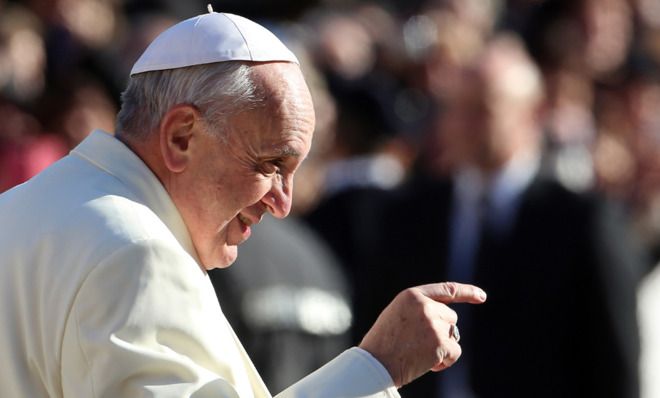A short history of Popes sneaking out of the Vatican
Pope Francis may or may not be sneaking out at night to tend to the poor. But he wouldn't be the first to do so.


The legend of Pope Francis seems to grow with each new news cycle.
This week, rumors started flying following an interview in which Vatican almoner Archbishop Konrad Krajewski — the pope's personal ambassador to the poor and downtrodden — said of his boss that "when I say to him 'I'm going out into the city this evening', there's the constant risk that he will come with me." When asked directly if the pope actually joined him sometimes, the Polish archbishop got coy, saying only, "Next question, please."
The Huffington Post fanned the flames, passing on this tip from a "knowledgeable source in Rome": "Swiss guards confirmed that the pope has ventured out at night, dressed as a regular priest, to meet with homeless men and women."
Subscribe to The Week
Escape your echo chamber. Get the facts behind the news, plus analysis from multiple perspectives.

Sign up for The Week's Free Newsletters
From our morning news briefing to a weekly Good News Newsletter, get the best of The Week delivered directly to your inbox.
From our morning news briefing to a weekly Good News Newsletter, get the best of The Week delivered directly to your inbox.
This isn't a new idea in the realm of fiction: The 1968 movie The Shoes of the Fisherman features Anthony Quinn as an occasionally Vatican-fleeing, friend-of-the-poor pope. Or watch this trailer from the 1986 film Saving Grace:
The stories about this pope sneaking out are being reported so credulously because he behaved similarly in his previous stint as archbishop of Buenos Aires. Also, "such tales seem right in line with Francis' unconventional and pastoral style," says David Gibson at Religion News Service. "What's more, the faithful always love it when a church leader sneaks under the radar to make a point," like a Mormon bishop did recently.
And to top it off, Pope Francis wouldn't be the first pope to break free of the Vatican's confines, if even for a short while.
Here are a handful of popes who really did (probably) venture out of the Vatican on the sly:
Sign up for Today's Best Articles in your inbox
A free daily email with the biggest news stories of the day – and the best features from TheWeek.com
POPE BENEDICT XVI
In January 2010, Pope Francis' predecessor covertly left the Vatican for a secret outing. However, it can't even charitably be described as an altruistic venture: Pope Benedict snuck out for a private tour of an art exhibit, "The Power and the Grace: The Patron Saints of Europe," at Rome's Palazzo Venezia Museum, on the last day its four-month run. He walked through the exhibit accompanied by a small retinue — two private secretaries and four women who ran his household — while the public waited outside for 35 minutes.
So Benedict's secret outing was less like Saving Grace and more like a mix of Entourage and the scene from Dave where the fake President Bill Mitchell, played by Kevin Kline, takes a secret tunnel out of the White House for a moonlight picnic with real First Lady Ellen Mitchell (Sigourney Weaver).
POPE JOHN PAUL II
The soon-to-be-canonized John Paul II's secret adventures outside the walls of the Vatican were to answer the call of the wild. An enthusiastic skier and outdoorsman in his native Poland, Pope John Paul II "could not resist the siren call of the mountains outside Rome, and on at least 100 occasions slipped away for some incognito schussing or mountaineering — sometimes even fooling the Swiss Guards who were sworn to protect him," says RNS's Gibson.
In a 2007 memoir, Cardinal Stanislaw Dziwisz — the late pope's longtime personal secretary — recounted John Paul II's reaction the first time they successfully evaded the Swiss Guards: A joyful "We did it!"
POPE JOHN XXIII
"Good Pope John" left the Vatican at night, dressed as a simple priest, both to visit the sick and to enjoy some free time in Rome. "His peregrinations even led TIME magazine to dub him 'Johnnie Walker,'" says RNS's Gibson. Of course, his nightly strolls weren't the only reason for TIME's nickname, Gibson adds: "John XXIII enjoyed a cocktail as well."
POPE PIUS XII
World War II–era Pope Pius XII is a controversial figure, long accused of indifference toward the plight of Holocaust-assailed Jews. But a "Jewish New Yorker who has made it his life's work to clear the name of Pope Pius XII of being anti-Semitic believes the wartime pontiff actually went undercover to save the lives of Jews in Rome," says David Kerr at the Catholic News Agency.
Gary Krupp, a former Pius XII skeptic who started researching the pope's history with Jews at the request of Jewish and Catholic leaders, recounts this anecdote from a letter written by a Jewish woman:
It is an unusual letter, written by a woman who is alive today in northern Italy, who said she was with her mother, her uncle, and a few other relatives in an audience with Pius XII in 1947... Her uncle immediately looks at the pope and he says, "You were dressed as a Franciscan," and looked at [Assistant Secretary of State and future Pope Paul VI Giovanni] Montini who was standing next to him, "and you as a regular priest. You took me out of the ghetto into the Vatican." Montini immediately said, "Silence, do not ever repeat that story." [Krupp, via CNA]
Krupp says the story is credible because the wartime pope "needed to see things with his own eyes," and had no hesitancy about publicly visiting bombed-out areas of Rome. "I can see him going into the ghetto and seeing what was happening."
EARLIER POPES
The problem with documenting secret expeditions by popes is that if they do it right, no one will know about them until a close confidant spills the beans years or decades later. So maybe some more service-oriented excursions by John Paul II or Benedict XVI will emerge in the years to come. "Breaking out of the 'gilded cage' of the Vatican has been a dream of many popes and other churchmen who fear losing touch with their calling as pastors — or simply their connection to ordinary life," says RNS's Gibson.
Since the very first pontiff, St. Peter, popes have visited prisons, using their influence to improve the condition of inmates, says Andrea Tornielli at La Stampa's Vatican Insider. "Both Innocent X (in 1650) and Clement XI (in 1704) paid surprise and secret visits to the construction sites of the Carceri Nuove ('new prisons') in Via Giulia and the San Michele rehabilitation center in Porta Portese, and they returned there once construction work was finished to meet the inmates and see how the prisons were managed." Other popes followed that tradition, too.
Some of the earlier popes, especially in the Borgia-heavy Renaissance era, were notably corrupt and secular — see Pope Alexander VI, who lived in wealth and openly doted on his children with mistress Vannozza dei Cattani — so their secret adventures were of another class altogether.
It's also true that some covert exits were less than voluntary. "As recently as 1848, Pope Pius IX had to flee the Vatican disguised as a priest — a persistent urban legend says he was dressed as a woman — ahead of rioters during Italy's struggle for national unification," notes Gibson. "That story is a true fact, but not one the Vatican is likely to be highlighting anytime soon."
Create an account with the same email registered to your subscription to unlock access.
Peter has worked as a news and culture writer and editor at The Week since the site's launch in 2008. He covers politics, world affairs, religion and cultural currents. His journalism career began as a copy editor at a financial newswire and has included editorial positions at The New York Times Magazine, Facts on File, and Oregon State University.
-
 Today's political cartoons - March 30, 2025
Today's political cartoons - March 30, 2025Cartoons Sunday's cartoons - strawberry fields forever, secret files, and more
By The Week US Published
-
 5 hilariously sparse cartoons about further DOGE cuts
5 hilariously sparse cartoons about further DOGE cutsCartoons Artists take on free audits, report cards, and more
By The Week US Published
-
 Following the Tea Horse Road in China
Following the Tea Horse Road in ChinaThe Week Recommends This network of roads and trails served as vital trading routes
By The Week UK Published
